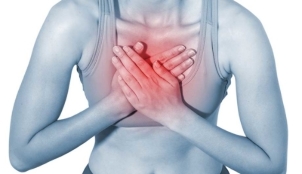
A less common form of osteochondrosis of absolutely everyone available — the chest. This form is considered the more terrible, as the symptoms of degenerative disc disease of the thoracic spine is often mistakenly attributed to other diseases, for example myocardial infarction or angina. From the article anyone can see how terrible this disease is and how to treat it, and also see the images on the subject of pathology.
What is GOH?
The disease is a degenerative dystrophic changes of intervertebral discs of the thoracic spine.
Thoracic spine consists of 12 vertebrae. He is less mobile and is well protected by the muscular corset. Because of these properties osteochondrosis is considered the most rare pathology.
However, taking into account a global focus to increase the incidence of low back pain, all become widespread episodes of degenerative disc disease with localization in the thoracic spine.
For a deeper understanding of the GOH, see the code of the disease and its forms according to ICD-10.
What are the specifics of this part of the spine?
Low mobility is associated with its anatomical hallmarks of the connection of the vertebrae with ribs and the sternum provides the opportunity to form a pretty flexible and robust system that is less exposed to injuries and external actions.
It has been statistically proven that a slight load on this unit facilitates the fact that the emergence of any complications you come across very rarely. But at the same time their occurrence cannot be described as something extraordinary, for example, failure to posture and curvature can be certain precipitating conditions leading to the emergence of diseases of the spine.
Reasons
The main cause of GOCH are degenerative changes in the tissues and complication of the metabolic actions due to poor nutrition and an unreasonable load on the intervertebral discs.
Often thoracic osteochondrosis formed as a result of prolonged sitting in an uncomfortable posture, in the presence of scoliosis, forming an uneven load on the spine.
The manifestation of Dorigo expressed sharp heavy pain, having the form of an unexpected attack. In addition to the restrictions of mobility of the spine may appear shortness of breath.
If dorsalgia pain localized in the area affected drives, it has a lengthy, relatively weakly manifested and accompanied by reduced activity in the lumbar-thoracic or in the cervical-thoracic spine.
Degree
Doctors there are 4 degrees of the disease:
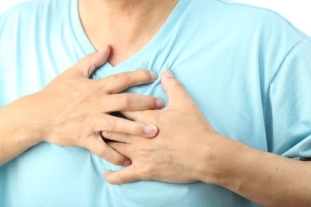
- Occurs due to rupture of an intervertebral disk, triggered by a sharp move or a huge load. The patient in this period feels a strong pain in the spine and tension of all muscles.
- Diagnosed if you experience symptoms of intervertebral disc protrusion (bulge to 5 millimeters) and the presence of an unstable spinal column. You should conduct a thorough diagnostic examination to identify the stage of the disease.
- Characterized by frequent feelings of pain, difficulty breathing, minor disorders of the heart and headaches. In addition, the high possibility of a herniated disc.
- Is considered the most dangerous to human health. It is the appearance of osteophytes that compress the spinal cord and its nerve endings.
Symptoms
Further explain everything important about symptoms at different stages.
In the beginning
In the early period of the disease completely expresses itself. Often even to strongly manifested pain syndrome come neurological disorders (nausea, "floaters" in eyes, etc.) that the patient associates with questions back.
Chest pain
Seen in the heart area, chest, back, flank, upper abdomen. Ailments are aggravated when you inhale and exhale during movement. May feel numbness of the left arm and interscapular areas.
The sensation of pressure
Pain between the shoulder blades from time to time accompanied by a feeling of lack of air when you inhale. Doctors advise not to panic and to sit down and determine the pulse.
If the runout does not exceed 100 beats per minute, the probability of the pathology activities of the lungs or heart is quite small.
Reflex syndromes
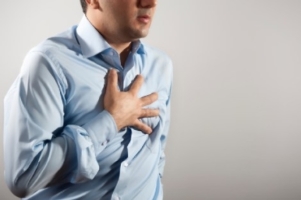
Reflex tension of paravertebral muscles observed during dorsalgia, often asymmetrical, is manifested on the convex side of the deformity.
Syndrome of the anterior chest wall. The pain is caused by the reflected stress and degenerative changes of the sternocleidomastoid muscle, starting at the sternum.
The pain increases when the load on the muscles of the chest, when turning the head and body.
Compression
Represents a strong and sudden flash of pain, the so-called "cross," which appears in the interscapular location and can appear at any time. Directly the time of seizure patients present as the "dagger stroke", followed by a sudden spasm of spinal muscles.
In addition to severe pain, manifested by shortness of breath and a significant limitation of freedom of movement. This complication of degenerative disc disease with periodic seizures can last up to several weeks.
What is dangerous radicular syndrome?
Osteochondrosis formed with radicular syndrome, always accompanied by pain. While pain spasms that are felt in the chest, often similar to angina. But unlike her, the pain factor can't be eliminated by receiving vasodilator drug and the suspension of physical activity. Every movement of the body, and in addition, cough and heavy breath provoke a significant increase in pain.
Common signs of radicular osteochondrosis of the thoracic, in addition to the pain of lumbago, are considered paresis, incomplete or absolute lack of receptivity and the change in the tendon reflexes of the tissues identified in the process of a neurological examination. Also, this syndrome may be accompanied by loss of hair, swelling of the limbs, blueness of the skin.
Signs in the subacute stage
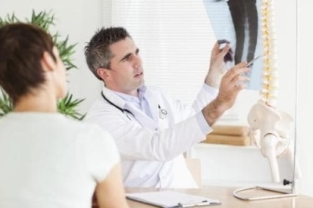
Starts after acute subacute stage of the process of thoracic osteochondrosis. Pain and breathing difficulties, however they are significantly less active. People are not looking for comfort of the body, which are not felt unwell.
The duration of subacute period up to 2 weeks. Subject to all medical appointments is a weakening of characterized by the absence of the manifested symptoms. Noncompliance with the regime leads to a new aggravation of degenerative disc disease.
Remission
In remission may appear a small uncomfortable feelings when the weather changes or after exposure. A sharp pain occurs only in osteochondrosis 2-4 severity due to sudden rotation or tilting of the body.
Psychosomatics
Consider psychosomatics cough.
What causes a cough?
In the pathology in the spine cough accompanied by pain in the throat, mostly on one side. At the beginning of their medical expression like a sore throat. In the later stages of degenerative disc disease of the unpleasant feelings become persistent, aggravated at night.
Neurological signs such as headache, dizziness, dizzy, blurred vision, feeling of fatigue, shortness of breath, appear inter vertebral discs, when the compressed nerve endings and arteries.
These feelings can be felt in the area of the stomach, resulting in the person being directed to the study of the liver, pancreas, etc, not thinking that the root cause of pain in osteochondrosis of the thoracic. With the combination of some forms of chondrosis neck and chest, people can complain of the feeling of foreign body in throat, which becomes pronounced after exercise or after a stay in uncomfortable posture.
The vegetative components of
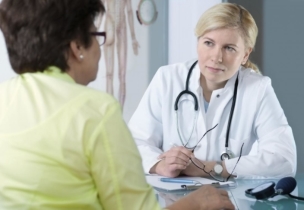
It can be:
- dryness and peeling of the skin in the area of innervation of individual nerve;
- local failure of sweating and thermoregulation (also in the area of innervation);
- tional chilliness of the extremities, brittleness of the nails in the feet;
- pain, simulating disease of the gastrointestinal tract (e.g., gastritis, gastric ulcer, cholecystitis, and so forth);
- pain in the kidneys, which is actually not associated with renal pathology (no change in the urine and ultrasound);
- pain in the heart, like angina and also myocardial infarction.
There is a spasm and dizziness?
When breast osteochondrosis observed spasm and dizziness.
What does the pathology of the vertebrae, is it possible for her to increase the pressure?
If thoracic degenerative disc disease can be diagnosed is also increasing pressure. As in the thoracic artery is located, the clamp has an influence on the pressure.
Is it possible to warm the body in the bath with high blood pressure?
Bath at a slightly elevated pressure can't hurt. In 3 or 4 stages of hypertension steam room is prohibited as it will lead to death. When in stage 1 and 2 hypertension target organs are not damaged, so the bathhouse is acceptable.
Digestive tract and disease
Through the form of osteochondrosis, pain in the intestines appear when pinched root in the region of 8-9 vertebrae (disturbed innervation of the digestive tract).
Painful impulses coming from the nerve endings of the spinal cord to the intestinal tract, enhance peristalsis. Person concerned about the bloating, cramping pain in the region of the duodenum.
Angina and disease
The thorax has many nerve fibers and plexuses, after which irritation pain. Otherwise, the intervertebral discs, tapering leads to compression of the nerve roots in the thoracic spine, resulting in pain mimics a heart attack.
Other common symptoms
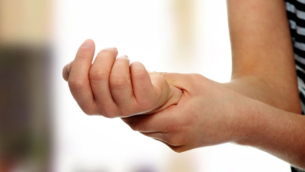
Disturbance of sensation in the hand, they become more cold, feel cold, according to him, "run creepy".
In certain embodiments, the signs of osteochondrosis of the thoracic resemble a panic attack (fear, palpitations, sweating). In combination with pain behind the breastbone it may be a symptom of myocardial infarction, for this reason it is better to take a vasodilator drug, and call for an Ambulance, which will make the cardiogram.
The digestive system: frequent exacerbation of gastritis, constipation, bloating, recurrent discomfort in the abdomen, intermittent diarrhea, without errors in diet.
Dorigo
Dorigo is sudden and sharp pain. Occurs when a person is in a certain position for a long time, then sudden change to her. May appear shortness of breath, difficulty breathing, muscle poorly controlled.
Dorsalgia
Dorsalgia is a stretching chronic pain, little is expressed, brings the patient some discomfort.
Arrhythmia
From damaged to any extent, of spinal roots is painful impulses to various internal organs, including the heart. While the acceptable appearance of symptoms of different variants of arrhythmias, however, more frequent of them is arrythmia (irregular heart for more reduction) or sinus tachycardia (uniform frequent palpitations).
Diagnosis
Diagnosis is quite difficult. This is due to the fact that this form of the disease has no obvious specific features characteristic of degenerative disease of the spine and runs from the medical manifestations of pathologies of the internal organs.
The independent diagnosis of degenerative disc disease of the thoracic you need to focus on the symptoms of diseases of internal organs. When it occurs, and the failure of a particular treatment, it is necessary to go through a differential diagnosis, which will help to determine the pathological process.
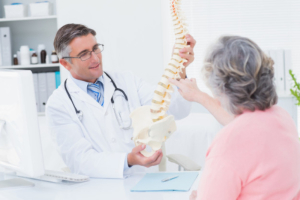
Detection of the disease, which has provoked the appearance in the chest area of the pain syndrome begins with a medical history.
In this case the expert with the maximum accuracy learn the nature of the unpleasant sensations and cause them prior. It will presumably help to establish that diagnosis, the patient may be thoracic osteochondrosis. The subsequent step is the individual inspection and palpation of the affected area. It provides the ability to determine the presence of intervertebral hernia.
While obtaining indirect evidence of the formation of thoracic degenerative disc disease, the doctor prescribes blood tests. This kind of study is necessary, as it shows the presence in the body of the inflammatory process that accompanies degenerative course in the spinal column.
But in order for maximum accuracy to establish the root cause of ailments in the chest, for the definition of osteoarthritis developing in the middle section of the spine, you must pass:
- Laboratory tests and instrumental diagnostics (ECG, ultrasound, x-ray).
- Neurologic examination.
- MRI to accurately establish not only the presence of intervertebral hernia, but the extent to which the affected degenerationism effect the nerve endings.
- X-ray in 2 projections.
Treatment
Only a holistic approach to treatment will enable to do away with all signs of osteoarthritis, suspend or entirely cease it from spreading on healthy disks and vertebrae. In the pathology of 1-2 degrees applied conservative methods of treatment. For degenerative disc disease 3-4 levels inherent in the formation of large hernias. In order to eliminate the constriction of their blood vessels and spinal roots, may need surgical treatment.
Medication
In the treatment of thoracic osteochondrosis are applied medication substance different clinical and pharmacological companies. At the initial stage, funds are used for intravenous administration, quickly has a therapeutic effect. After a few days of injection solutions in lieu of tablets, ointments, patches.
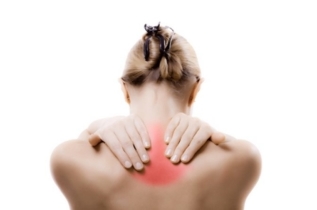
Nonsteroidal anti-inflammatory
NSAIDs have shown analgesic, anti-inflammatory, anti-edematous effect. Localized sharp pain will allow intramuscular solutions.
To eliminate the minor discomfort between the shoulder blades, use tools for local application. And with mild pain NSAIDs are going to do well for oral.
Muscle relaxants
To eliminate the muscular spasms that are formed in response to great pain, are relaxants.
Chondroprotectors
At pathology level 1, course the adoption of chondroprotectors promotes the renewal of damaged discs. In other embodiments, the drug is prescribed to improve the metabolism in the affected sector of the spine, prevention of disease progression.
The vitamins of group B
Vitamins are entered in the drug regimens of patients with pathology of any level of severity. Their use helps to increase blood circulation, improve the activity of the peripheral nervous system, the resumption of trophism and innervation.
The combination of vitamins the B has a beneficial effect on degenerative diseases of the nerves and musculoskeletal system.
Physiotherapy treatment
In the treatment of thoracic osteochondrosis are applied magnetotherapy, laser therapy, UHF-therapy, sinusoidal currents, shock wave therapy, applications with paraffin and ozokerite. When exacerbations are electrophoresis, phonophoresis with corticosteroids, anesthetics, and vitamins a, category B, chondroprotectors.
Massage and manual techniques
The massage helps to eliminate pain between the shoulder blades, spazmirovannah relaxation of skeletal muscles.
Osteochondrosis therapeutically effective all types of massage — a traditional, vacuum, acupuncture, connective tissue.
At home massage comfortable to implement with the help of electric massager with a long handle.
Gymnastics and physical therapy
If thoracic degenerative disc disease 1 level of everyday physical therapy sessions provide an opportunity to dispense medication. The treatment is conducted by maintaining the muscles, improvement of blood supply of tissues with nutrients. In other embodiments, gymnastics and regular classes can help prevent the inclusion in the destructive process of healthy vertebral parts, to continue the remission.
A set of exercises at home
Exercises in the standing position:
- bending forward, lifting alternately the bent leg;
- tilts to the side with arms raised alternately;
- bending forward, trying to reach the hand opposite of the foot.
The number of repetitions — 10-12 times in 2-3 sets.
Exercise in the lying position need a sports rug or a thick, folded twice blanket:
- lying on stomach, lift legs and arms simultaneously.
- lying on your back to lift your upper torso, reach hands to feet;
- lying on the back bend 1 leg to get her for another, trying to touch knee to floor.
Each lesson need to be completed in 7-10 times.
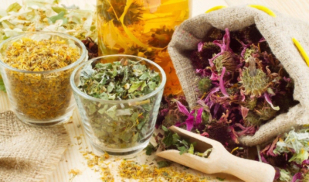
Folk remedy to chondrosis
Decoctions and infusions are pharmaceutical plants, ointment, alcohol, and oil rubbing, compresses neurologists allow you to use after the main therapy.
Folk remedies are applied to eliminate minor ailments between the shoulder blades, sometimes appearing after physical exercises. Used celery root and sunflower seed, also you can make homemade ointment.
Feature of therapy at exacerbation
Treatment involves:
- localization of symptoms, local pain, and analgesics for internal use;
- bed rest;
- wear the corset for the vertebral fixation.
If the exacerbation is severe, you need to call an ambulance. On admission to the hospital the doctor watch the patient's condition and select a medication.
How to remove attack?
Pain in the period of recurrence of thoracic degenerative disc disease can be acute, piercing, so you should give first aid. The patient must be calm, put on a hard surface, cover with a warm blanket. If the repetition is accompanied by palpitations, shortness of breath, high anxiety, the need to call the doctor. To mitigate pain allowed to take any nonsteroidal anti-inflammatory drug.
Complications and consequences
In the absence of medical intervention breast osteochondrosis may be a factor of pulmonary fibrosis, arrhythmias, dystonia, offset the worse of the gastrointestinal tract, pathologies of sexual and reproductive function in girls and men.
Without prompt proper treatment it can provoke subsequent diseases:
- protrusion and hernia of the thoracic spine;
- compression of the spinal cord;
- problems with the heart, intestines, liver, kidneys and pancreas.
- irregularities in the duodenum, peristalsis in the intestinal tract, dyskinesia of the gallbladder;
- intercostal neuralgia — compression or squashing or irritation of the intercostal nerves.
Prevention
The Outlook is positive with early detection of the disease, comprehensive treatment. In case there were complications of thoracic osteochondrosis, only compliance with all medical appointments will provide an opportunity to achieve stable remission.
In the prevention of pathology neurologists suggest to exclude from the normal way of life provokes its causes. This excess weight, low physical activity, lack of vitamins and minerals, the extra load on the spine.
The correct position at rest and during sleep
Proper planting. On soft furniture is not recommended. Excessive pressure on the spine can help to avoid such condition, if the body is supported by the ischial tuberosity. It may be only on hard chairs. The height of the chair is required to be on a par with the shins. The foot must lean into the floor. Every 15-20 minutes it should change the position of the feet, to perform their workout. The back should adjoin closely the back of the chair. The body must keep straight.
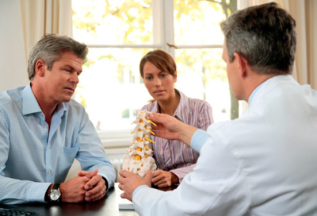
How to stand in osteochondrosis. If you have time, on the spine lies a lot of work, especially on the lower back.
- To help the spine to reduce the load necessary every 10-15 minutes to change the posture.
- You need to rely on 1, then on the other leg.
- Allowed to walk on the spot, ie not to be a pillar, and move.
- Sometimes it is necessary to bend back, stretching his arms up and taking a full breath.
These procedures are needed in order to remove the fatigue of the muscles of the back, neck, shoulder girdle.
How to sleep?
Lying on your back with bent legs, and the vertebrae remain physiological for them as, in contrast to the posture, when the legs are straightened – the muscles of the lower back remain in a state of stress.
Lying in the fetal position – on its side pulled up to chest bent legs. For the greatest comfort possible to put a small pillow under his feet. In this position the spine is very relaxed and the patient feels better.
The advice of doctors
Each complex health physical education takes an important role swimming. It is extremely effective for prevention of osteoarthritis. The navigation is possible as a treatment method with the previously formed osteochondrosis, but not at the time of the acute illness, only if there are no complaints of ailments in spine and limbs.
Good medical result provides an innovative system couples massage. Pain syndrome removed a similar massage to the first procedure.
Diet and nutrition during pregnancy
Many analgesics during pregnancy is contraindicated, and for this reason neurologists give priority to medicines for external use — ointments, gels, patches. If without taking pills can not do, their dose is considerably reduced. During child-bearing the main methods of treatment of thoracic degenerative disc disease massage and exercise therapy.
Nutritionists advise patients to refrain from fatty meat, fatty soups, smoked meats, homemade pickles and factory. You need to reduce in food the amount of salt that triggers the development of edema. Every day should drink approximately 2.5 liters of liquid — water, vegetable juice, berry fruit drinks, fruit compotes.
To avoid problems with the thoracic spine, it is often necessary at the first symptoms to see a specialist. Not to self-medicate. If you suspect breast osteochondrosis should be a thorough diagnosis, to be able to differentiate thoracic osteochondrosis other diseases.































